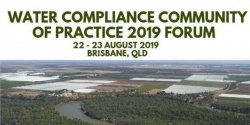
Search archive
Network News - July
31/07/2019

All the latest from AELERT including the recent Secretariat visit to Tasmania, our Woodsmoke Webinar, featured Discussion Board questions and the latest Environmental Regulation news.
Registrations for the AELERT Water Compliance Forum now open!
16/07/2019

Registrations for the AELERT Water Compliance Community of Practice (CoP) 2019 Forum are now open! The purpose of the Water Compliance CoP is to share information on cross-cutting issues, solve problems, and promote best practice in water compliance policy and operations amongst Australian States and the Australian Government in a collaborative way, while building capability within the AELERT network. The 2019 Water Compliance CoP forum will be held in Brisbane, Queensland. It is being jointly hosted by the Murray–Darling Basin Authority and the Queensland Department of Natural Resources, Mines and Energy.
Water compliance practitioners in policy, operations, coordination, and management, from all Australian States and Territories are invited to attend. If you are unable to attend, or have changed your role, please consider forwarding this to a colleague.
The forum will involve:
- A keynote presentation
- Panels and guest speakers
- Breakout sessions
- An optional post forum dinner
- An optional field trip on 23 August 2019
The agenda will be confirmed closer to the date of the forum. If you have any questions about the Water Compliance CoP or the forum, want to refer a colleague to join the CoP, or want to suggest an agenda item at the forum, please contact the team at watercopcoord@mdba.gov.au
FREE Webinar For AELERT Members
01/07/2019

"Who's Pluming Who?" Woodsmoke in Tasmania
John Innis, Senior Scientific Officer, EPA Tasmania
Tasmania's location in the roaring forties combined with its comparatively small population, low traffic levels, and limited large-scale industry, results in low ambient levels of most of the Air NEPM criteria pollutants. However, for PM2.5 (particulate matter up to 2.5 millionths of a metre in effective diameter) Tasmania has a number of centres that exceed the 24-hour standard. The cause is woodsmoke from winter wood heating, bushfires, and planned burning operations.
In 2009, EPA Tasmania commenced a program of establishing a near-state-wide smoke monitoring network, using instrumentation that was both state-of-the-art and much lower cost than conventional instrumentation. This program was called "BLANkET" - the Base-Line Air Network of EPA Tasmania, and currently consists of 35 stations across Tasmania.
The rich BLANkET dataset has provided significant insight into smoke levels and detailed information on smoke movement and dispersal across Tasmania. The data is used in improving smoke-management practices from planned-burning operations, assisting public health response during bushfires, and for real-time public information, as well as to inform EPA Tasmania for assessing air quality against national standards. The data has allowed us to assess the relative sizes of the smoke impacts from the various sources.
The data indicates that most Tasmanians receive most of their particle exposure from winter woodheater smoke. Woodheater education programs are conducted each winter by both EPA Tasmania and local councils. In general however these do not appear to have significantly lowered winter smoke levels.
This talk will present an outline of BLANkET, overview the new understandings that have arisen from the data, and will consider some of the broader aspects of smoke pollution in Tasmania.
Where:
Once live, you can watch the webinar with this link and even post questions during the talk: bit.ly/smokeTAS
If you are based in the Launceston area you’re welcome to attend in person, simply email secretariat@aelert.net
When: Tuesday 9 July 10:30am AEST
Time by jurisdiction:
TAS, NSW, ACT, VIC, QLD 10:30am – 12pm
SA, NT 10am – 11:30am
NZ 12:30pm – 2:00pm
WA 8:30am – 10am

